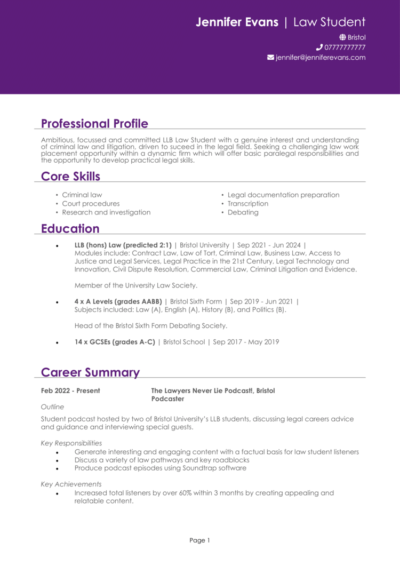Everyone has to start somewhere – even the CEO of the company you’re applying to had a first job once. But without previous work experience to lean on, how do you convince an employer that you’re the right person for the role?
A great CV isn’t just about listing past jobs – it’s about showing that you have the skills, attitude, and potential to succeed. You already have more experience than you think, even if you’ve never had a formal job before.
This guide and some first job CV examples will show you how to craft a CV that highlights your strengths, education, and transferable skills – helping you take that first step onto the career ladder.
First Job CV example
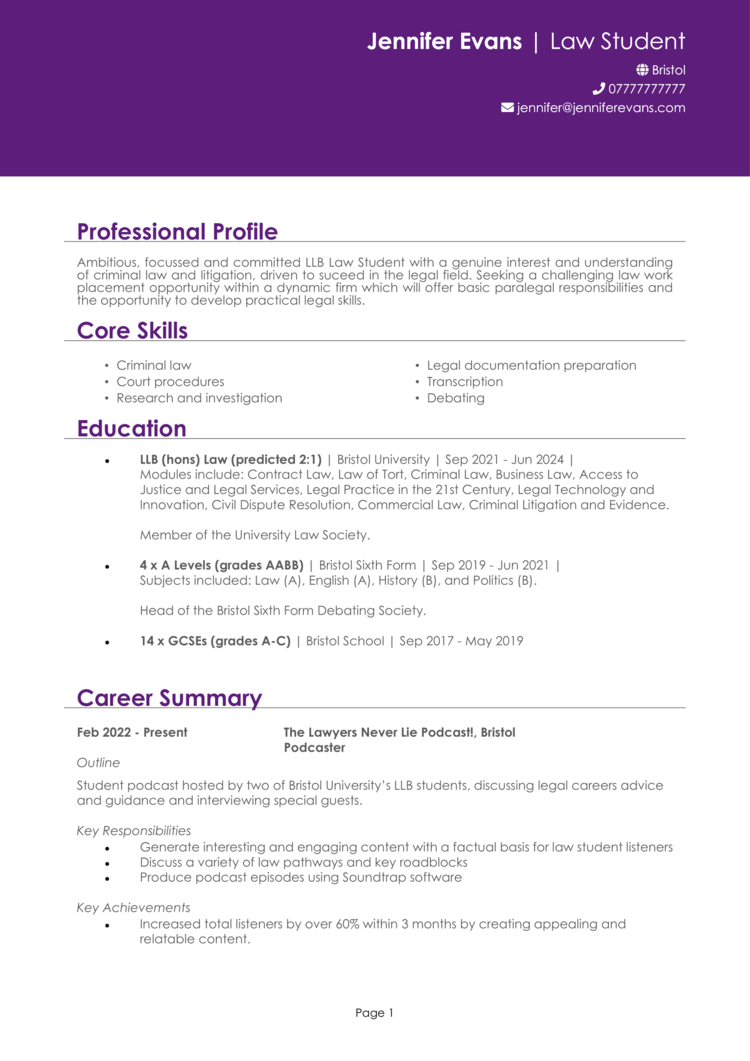
School Leaver CV example
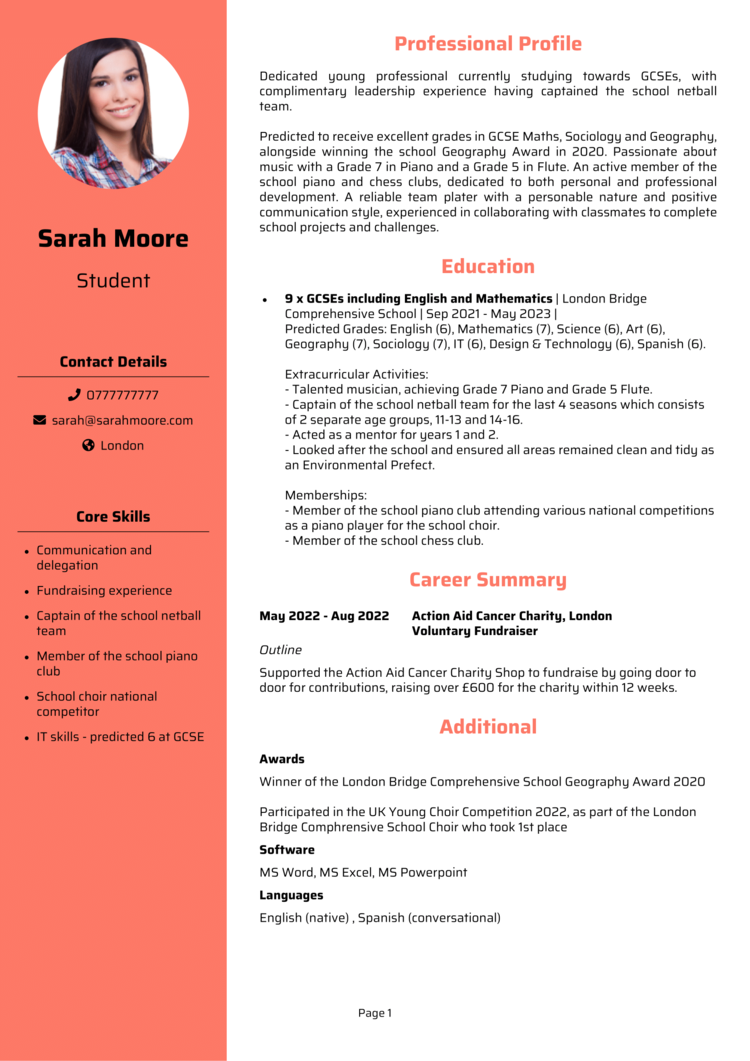
Student CV example
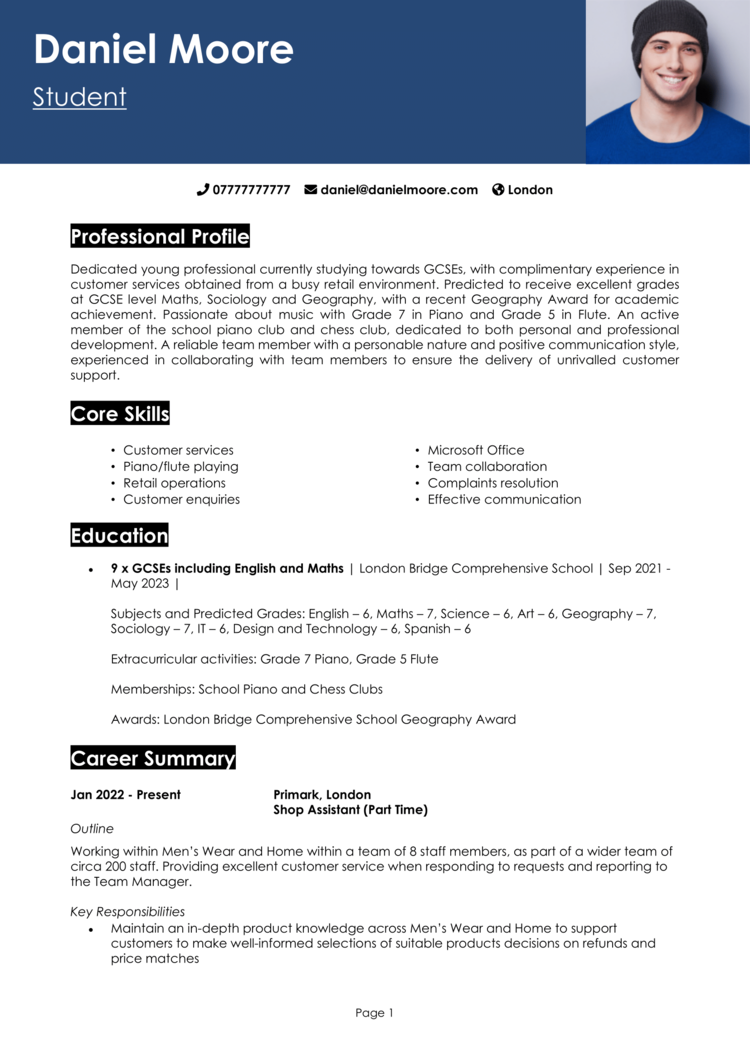
Student with no exp CV example
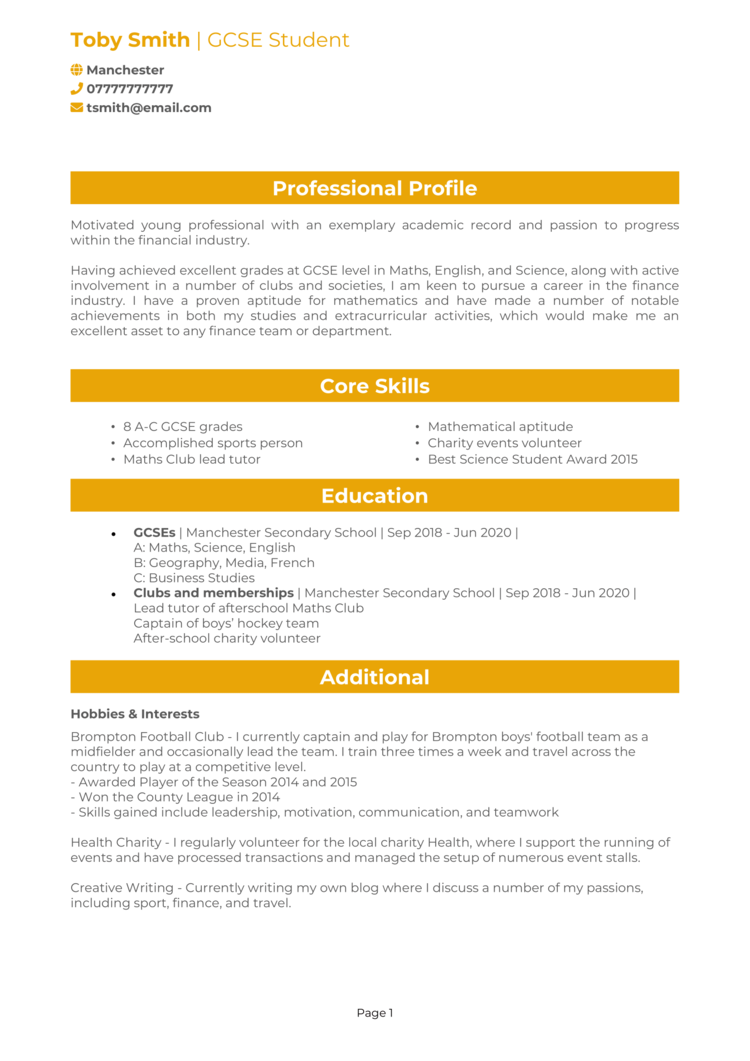
How to write your First Job CV
Learn how to create your own interview-winning First Job CV with this simple step-by-step guide.
Writing a CV for your first job might feel daunting, but employers aren’t expecting a long list of professional achievements. Instead, they want to see enthusiasm, reliability, and a willingness to learn.
This guide will take you step by step through structuring your CV, formatting it professionally, and ensuring your application stands out – even if your work experience section is looking a little empty.
What is the correct structure for your First Job CV?


A well-structured CV helps recruiters quickly understand your strengths and potential. Since you may not have much work experience, focusing on education, skills, and any relevant activities is key.
Here’s how to organise your CV structure:
- Name and contact details – Keep personal details at the top so employers can easily reach you; a photo of yourself is always optional.
- Personal statement – Start with a short introduction that highlights your strengths, motivation, and career ambitions.
- Core skills – Give recruiters a snapshot of your abilities, such as teamwork, communication, and problem-solving.
- Education – Whether you’re a school leaver or a graduate, you should highlight any relevant subjects, coursework, or projects which you worked on during any course or degrees.
- Work experience – Include any part-time jobs, volunteering, internships, or extracurricular activities – it all shows transferable skills.
- Additional info – Mention hobbies, interests, or awards that demonstrate useful skills for the workplace.
First Job CV format


Your CV format should be easy to read – if it looks like a rushed school project, a recruiter might assume your work ethic is the same.
Employers aren’t looking for flashy designs – just a well-organised, simple document that quickly tells them what they need to know, so don’t let formatting mistakes hold you back from great new opportunities.
Follow these formatting tips:
- Bullet points – Use these to highlight key skills and achievements quickly and clearly.
- Divide sections – Separate parts of your CV layout logically so it’s easy to navigate.
- Use a clear and readable font – Stick to professional and clean fonts, and a sensible colour scheme.
- Keep it 1 page long – Without any formal work experience, a single page is plenty of length to cover everything.
First Job CV personal statement


Your personal statement is your first chance to make an impression. Since you may not have work experience, this section should focus on your enthusiasm for the job, key strengths, and career ambitions. You’ll need to convince recruiters that hiring you would benefit them and their company.
A personal statement might not cover everything, so for your first job, you should make use of a tailored cover letter, personalised for each job you’re applying for.
First Job CV personal statement examples
Profile 1
Hardworking and adaptable candidate looking for entry-level opportunities to gain practical experience. Informal work experience includes volunteering, babysitting, and assisting in school events. Passionate about developing key workplace skills such as communication, teamwork, and time management. Committed to learning and performing tasks efficiently in any given role.
Profile 2
Enthusiastic and dependable first-time worker eager to develop workplace skills through real-world experience. Previous experience includes shadowing professionals, assisting in local charity initiatives, and helping with administrative tasks for family businesses. Keen to apply problem-solving abilities and organisational skills in a professional setting while gaining valuable industry knowledge.
What to include in your First Job CV personal statement
To create a strong profile, you should be including:
- Why you’re looking for your first job – Show enthusiasm and a desire to develop new skills.
- Your key strengths – Highlight qualities such as reliability, teamwork, and problem-solving.
- Relevant qualifications or achievements – If you’ve taken part in extracurricular activities, volunteering, or coursework that demonstrates your skills, mention them.
- Career aspirations – Employers like to see that you have ambition and a desire to grow.
Presenting your core skills


A CV skills section gives recruiters a quick snapshot of what you bring to the role. Since you may not have direct job experience, this section should highlight transferable skills that show you’d be a great fit for the workplace.
Think about any activities where you’ve developed useful skills – whether it’s school projects, teamwork in sports, or responsibilities at home. Tailoring this section to the role you’re applying for will make your CV more relevant.
Top skills for your First Job CV
- Customer Service – Providing friendly and professional assistance to customers, clients, or colleagues.
- Time Management – Organising tasks effectively to meet deadlines and workplace expectations.
- Teamwork and Collaboration – Working well with others to achieve common goals and maintain a positive work environment.
- Communication Skills – Clearly expressing ideas, following instructions, and engaging with customers or colleagues.
- Adaptability and Willingness to Learn – Quickly grasping new skills, procedures, and workplace responsibilities.
- Basic Computer Proficiency – Using software like Microsoft Office, Google Workspace, or industry-specific tools.
- Problem-Solving – Identifying challenges and finding solutions to improve efficiency or customer satisfaction.
- Cash Handling and POS Operation – Processing transactions and handling payments accurately (if in a retail or service role).
- Organisation and Attention to Detail – Keeping work areas tidy, following procedures, and completing tasks accurately.
- Workplace Etiquette – Understanding professional behaviour, punctuality, and following company policies.
How to write your education section


Since you have little to no work experience, your education section plays a bigger role in your CV. Employers know you’re at the beginning of your career, so they’ll look at your education to get a sense of your skills, knowledge, and overall work ethic.
Make sure to include:
- Your most recent qualifications – List your GCSEs, A-levels, BTECs, or any equivalent qualifications.
- Subjects relevant to the job – If you’re applying for a customer service role, highlight subjects like English and Business. If it’s a tech-based job, mention IT or Computer Science.
- Predicted grades (if still studying) – If you’re still in school or college, mention any expected results.
- Notable coursework, projects, or achievements – If you worked on a project that involved problem-solving, teamwork, or research, mention it here.
- Additional training or certifications – If you’ve completed any online courses, workshops, or first aid training, these can strengthen your application.
If you’re applying for an apprenticeship or a role that involves on-the-job training, show that you’re a keen learner by highlighting subjects where you developed problem-solving, communication, or technical skills. Even if your grades aren’t perfect, what matters most is showing that you’re proactive and willing to develop.
Example education sections
Education 1
Distinction MSc Environmental Science | University of Manchester | 2022–2023
Modules included Climate Change Mitigation, Environmental Policy, and Sustainable Resource Management. Completed a thesis on the impact of urbanisation on biodiversity, earning a distinction.
First Class BSc (Hons) Geography | University of Bristol | 2019–2022
Modules included Geographical Information Systems (GIS), Human Geography, and Earth System Science. Conducted a research project on the effects of coastal erosion on UK communities, achieving a first.
3x A-Levels (AAB) | Manchester Sixth Form College | 2017–2019
9x GCSEs (A*-C) | Manchester High School | 2015–2017
Education 2
9x GCSEs (A*-C) | Birmingham Community School | 2019–2021
Subjects included Mathematics (B), English Literature (A), Science (B), Geography (A), and Business Studies (A).
What to include in your education section
For each qualification, add the following info:
- Qualification & organisation – State what you studied and where you did so
- Dates studied – Give the dates for when you earned the qualification
- Extra details – If they apply to the particular sort of roles you’re aiming for, expand a bit on certain modules and courses, outlining how the skills you developed on them will help you in the workplace.
Best qualifications for your First Job
- GCSEs or A-Levels – Employers often look for basic qualifications in Maths and English.
- BTEC or NVQ in a relevant field – These demonstrate practical learning and skills.
- Customer Service or Retail Training – Useful for customer-facing roles.
- Health and Safety Training (if applicable) – Beneficial for roles in hospitality or retail.
- IT or Digital Skills Courses – Useful for office-based or tech-related roles.
Work experience


Even if you haven’t had a formal job before, you may have more experience than you realise. Part-time roles, volunteering, internships, and extracurricular activities all count as work experience.
This section should highlight any roles where you’ve demonstrated key skills such as responsibility, customer service, teamwork, or problem-solving. If you don’t have any direct work experience, you can use school projects, clubs, or personal initiatives that show your abilities.If you’ve got any references, there’s no need to include them at this stage of the recruitment process.
What’s the best way to structure job history on your CV?

- Outline – Introduce the role, organisation, or activity where you gained experience.
- Responsibilities – Explain what you did in the role. Use action words like “assisted”, “supported”, and “organised”.
- Achievements – Highlight any key successes, such as learning a new skill, taking on responsibility, or receiving positive feedback. If possible, back them up with some tangible figures.
Work history examples for your first CV
Volunteer Helper | CommunityHelp
Outline
Assisted in the planning and execution of a local charity event, supporting organisers and engaging with attendees.
Responsibilities
- Set up event spaces, including arranging seating and signage.
- Helped distribute food, drinks, and promotional materials to attendees.
- Directed guests and answered questions about the event schedule.
- Assisted in collecting donations and tracking contributions.
- Participated in post-event clean-up and inventory management.
Achievements
- Helped raise £2,000 for a local charity through active participation.
- Recognised by organisers for reliability and willingness to take on tasks.
- Gained valuable teamwork and customer service experience in a busy event setting.
Assisting family business | End Terrace Convenience Store
Outline
Assisted in a small family-run business, learning about basic business operations and customer service.
Responsibilities
- Helped organise inventory and restock shelves in a retail setting.
- Assisted with basic bookkeeping tasks such as recording sales transactions.
- Welcomed and assisted customers with inquiries and product recommendations.
- Managed deliveries by unpacking and sorting new stock.
- Handled simple administrative duties, such as answering phone calls and taking messages.
Achievements
- Improved organisational skills by maintaining an efficient inventory system.
- Gained confidence in customer service by assisting and engaging with customers.
- Recognised by family business owners for reliability and attention to detail.
Additional info


The additional info section is an optional part that can be added to the bottom of your CV, for things like hobbies and interest, languages or awards.
Here you should have anything that might help recruiters see that you are good fit for the role.
Good additional info for your First Job
- Hobbies – Include activities that show key workplace skills like teamwork, creativity, problem-solving, or reliability. Sports, gaming, creative projects, or social media management can be relevant.
- Volunteering – Any unpaid experience, such as charity work, event assistance, or helping out in a family business, demonstrates responsibility and initiative.
- Awards and Achievements – Any recognition from school, sports, or extracurricular activities shows dedication and motivation.
- Extracurricular Activities – Participation in clubs, teams, or student groups highlights teamwork, leadership, and commitment—qualities employers look for in entry-level candidates.
- Skills and Certifications – Any self-taught skills, online courses, or formal certifications (such as First Aid or customer service training) can make your application stand out.
Additional info example
Additional info
Hobbies
Social media content creation – Managed a personal Instagram page, learning engagement strategies and digital marketing basics.
Football – Played in a local team, improving teamwork, communication, and leadership skills.
Creative writing – Wrote and published short stories online, refining communication and storytelling abilities.
Volunteering
Community fundraising – Helped organise a charity event, gaining experience in teamwork and event planning.
Food bank assistant – Assisted with sorting and distributing donations, developing organisational and people skills.
Awards and Achievements
Perfect attendance award – Recognised for reliability and commitment to school.
School talent show finalist – Developed confidence and presentation skills through public performance.
Extracurricular Activities
Student council member – Helped plan school events and represented student interests in meetings.
Drama club – Participated in stage productions, improving confidence and teamwork.
Skills and Certifications
Customer Service Basics – Completed an online course covering professional communication and customer interactions.
Microsoft Office – Proficient in Word and Excel, used to complete school projects and presentations.


